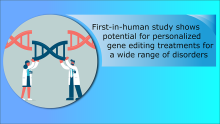Gene-Targeted Therapies
We are developing generalizable approaches to advance gene-targeted therapies for many rare diseases.
About Gene-Targeted Therapies
About 80% of all rare diseases are caused by mutations in a single gene. Gene-targeted therapies are treatments aimed at editing, replacing or turning off the mutated genes that cause disease. A growing number of gene-targeted therapies have been approved by the U.S. Food and Drug Administration for rare diseases, such as spinal muscular atrophy, Duchenne muscular dystrophy and sickle cell disease.
A big challenge in developing gene-targeted therapies for more rare diseases is lack of commercial interest. Many rare diseases are so uncommon that companies can’t or won’t invest the years of research and millions of dollars needed to develop, test and bring a gene-targeted therapy into clinical trials and ultimately to market. We are changing that.
NCATS develops therapeutic platforms that work across many diseases to address unmet health needs faster. Gene editing and gene therapies use broadly applicable methods that can support the development of treatments for a wide range of rare diseases. Our gene-targeted therapy efforts standardize study designs and manufacturing processes, develop new delivery systems, and streamline navigation of regulatory processes — all to meet the goal of more treatments for all people more quickly.
These efforts are a partnership with other parts of NIH, and some also include partners from the U.S. Food and Drug Administration (FDA), industry and patient organizations. The collaborative approach allows each partner to bring its expertise and other resources, enabling faster progress for more diseases. The teams publicly share what they learn, including key communications with the FDA, to spur efforts led by others.
In just a short period of time, these research activities have produced important outcomes — from a comprehensive guide to preparing investigational new drug (IND) submissions for gene therapies to a gene-editing treatment for a newborn baby with a rare disease.
Gene-Targeted Therapies Research Activities
Bespoke Gene Therapy Consortium
We help lead this public-private partnership program that focuses on developing platforms and standards to speed the development and delivery of gene therapies for rare diseases.
Platform Vector Gene Therapy
Our pilot project is testing the feasibility of increasing the efficiency of gene therapy clinical trial startups by using the same gene delivery system and manufacturing methods for multiple gene therapies.
Somatic Cell Genome Editing
We help lead this NIH Common Fund program that aims to create and make available high-quality tools for safe and effective genome editing to decrease the time and cost of creating new therapies.
MMA-101 Gene Therapy Trial
We are collaborating with scientists and clinicians across NIH to develop a gene therapy clinical trial for a rare metabolic disease, which could lead to more gene-targeted therapy trials at the NIH Clinical Center.
More About Rare Diseases
Rare Diseases Research Activities

We are addressing the public health challenges posed by rare diseases through a variety of collaborative research efforts.
Resources for Rare Disease Patients and Advocates

We work with patients and patient groups to identify their health needs and find ways to meet them. We connect you with the latest research and show you how to get involved.
Gene-Targeted Therapies News

Infant with Rare, Incurable Disease is First to Successfully Receive Personalized Gene Therapy Treatment
May 28, 2025 - NCATS News
- Our Impact on Rare Diseases
- Somatic Cell Genome Editing (SCGE)
NIH-supported gene-editing platform lays groundwork to rapidly develop treatments for other rare genetic diseases.
Read ArticleMapping ‘Dark’ Regions of the Genome Illuminates How Cells Respond to Their Environment
September 25, 2025 - Grantee/Partner News
- Somatic Cell Genome Editing (SCGE)
Research Spotlight: Laying the Foundation for Gene Editing for Inherited Progressive Deafness in Adults, DFNA41
August 14, 2025 - Grantee/Partner News
- Somatic Cell Genome Editing (SCGE)
Gene Editing Reverses Symptoms of Rare Brain Disorder in Mice
July 22, 2025 - Grantee/Partner News
- Somatic Cell Genome Editing (SCGE)


